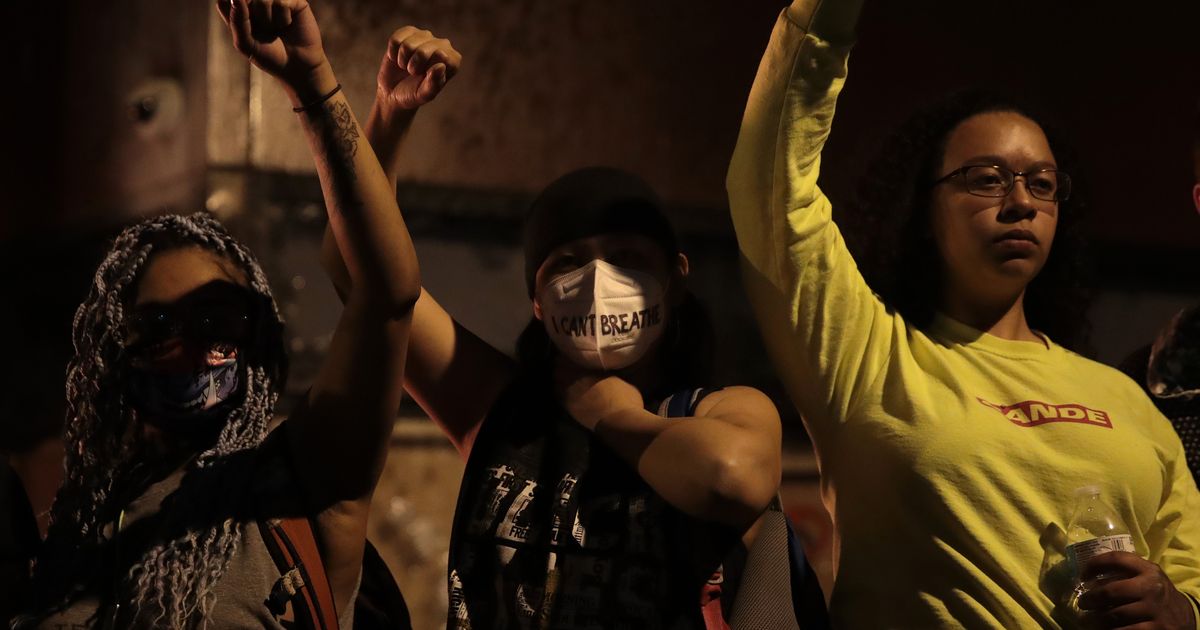
You can seek justice for George Floyd wherever you are.
On May 25, Floyd died after a Minneapolis police officer pressed his knee against Floyd’s neck for 8 minutes and 46 seconds, according to the criminal complaint against the officer, who has been arrested and charged with murder. The officer, Derek Chauvin, ignored Floyd’s insistence that he couldn’t breathe.
In the days that followed Floyd’s death, protests broke out in Minneapolis, despite the pandemic. For many, Floyd’s death made plain just how unyielding police violence is against black Americans, even as the world grapples with the deadly coronavirus.
Those protesting in Minneapolis, and now across the country, are demanding justice for Floyd, calling for the firing and arrest of the officers involved in Floyd’s death, as well as a reformed and defunded police force. While Chauvin was charged with third-degree murder and manslaughter on Friday, investigations into the three other officers present during Floyd’s death are ongoing.
The scene in Minneapolis and neighboring areas quickly escalated after protests began earlier this week. While many protested peacefully, some destroyed property and started fires. Officers donned riot gear and fired tear gas and rubber bullets at unarmed protesters, and the National Guard was activated in Minneapolis and surrounding areas on Thursday. A video of a cop pepper spraying demonstrators from inside a police vehicle while driving by ricocheted across social media. A CNN crew was arrested while live on air.
On top of that, President Donald Trump tweeted “when the looting starts, the shooting starts,” a racially-charged dog whistle. Twitter hid the tweet because it “glorified violence.” Hours later, Trump said he didn’t know the phrase’s racist history.
If all of this makes you angry, there are a number of ways that you can support efforts to seek justice for Floyd, as well efforts to protect protesters who have been arrested.
Remember: In addition to supporting these causes, it’s crucial that you educate yourself on how to actively be anti-racist and understand the basics of racial justice if you haven’t done so already.
1. Sign petitions demanding officers are charged
While Chauvin was charged with third-degree murder and manslaughter, the three other officers present during Floyd’s murder haven’t yet been charged.
These petitions, from Change.org and Color of Change, both of which raise money for community change, are one way to tell Hennepin County attorney Mike Freeman to bring murder charges against the other three officers.
Additionally, signing the Color of Change petition will also call for the release of protesters who have been arrested.
2. Donate and support local organizations
Financial support can go to those most closely impacted and those most directly on the ground.
To that end, there’s a GoFundMe, the Official George Floyd Memorial Fund, which is being organized by Floyd’s brother, Philonise, in order to cover the costs of George’s funeral, as well as grief counseling, court proceedings, and to continue seeking justice.
Additionally, you can support Black Visions Collective and Reclaim the Block, two Minneapolis-based groups that work within the racial justice space.
Finally, you can donate to the Minnesota Freedom Fund, a group currently providing jail bonds to protesters who have been arrested. The fund quickly went viral as public figures matched donations, and encouraged others to do the same.
3. Consider showing up for a local protest or demonstration
In addition to providing support online, you might look too see if your local Black Lives Matter or Showing Up For Racial Justice chapter, as well as other local racial justice organizations, are organizing demonstrations in your area. (They might also provide other ways to virtually demonstrate, so it could be helpful to keep an eye out for those efforts.)
If you do decide to attend a demonstration, it’s imperative that you work to ensure the physical safety of yourself and those around you. You should follow the Centers for Disease Control and Prevention guidelines, including wearing a mask and maintaining six feet of distance from other people, and perhaps consider bringing extra masks and hand sanitizer.
We will be distributing PPE near Barclays for any protesters in need. Please reply here if you need it. It is important that our communities not take on any more risk than necessary. Be safe. Stand strong.
— Dianne Morales (@Dianne4NYC) May 29, 2020
THEY ARE PREPARING FOR WAR INFRONT OF BARCLAYS CENTER:
– WEAR MASKS
– BRING WATER BOTTLES IN CASE OF TEAR GAS USE
– WEAR KNEE PADS AND SHOULDER PADS
– PREPARE TO HELP OTHERS AND YOURSELVES
BE SAFE! PLEASE pic.twitter.com/NJKREMb5kp— black lives matter everyday allday (@jetweste) May 29, 2020
Additionally, it’s important to note that in some places, breaking a shelter-in-place order can have major legal implications. Before attending any event that requires you to congregate in a large group, you should check the local laws pertaining to sheltering in place to know what the legal implications of your action could be. (And as protests in Minneapolis made clear, your safety could be compromised in other ways as well.)
